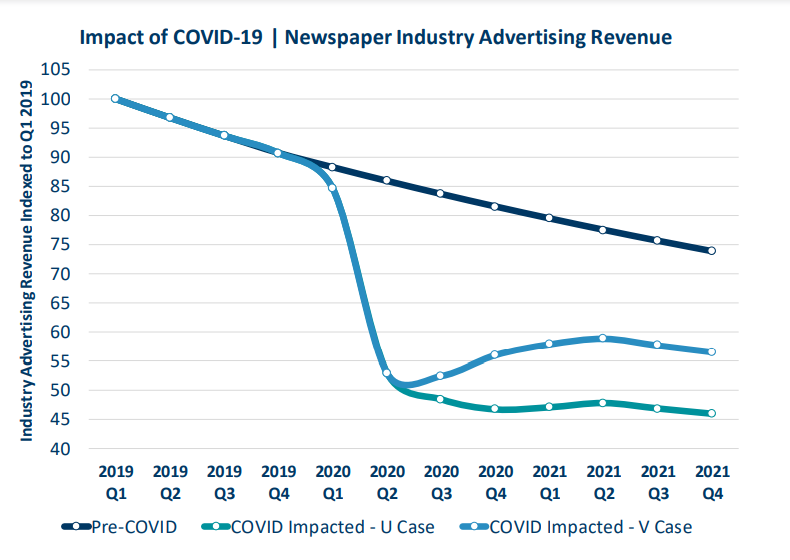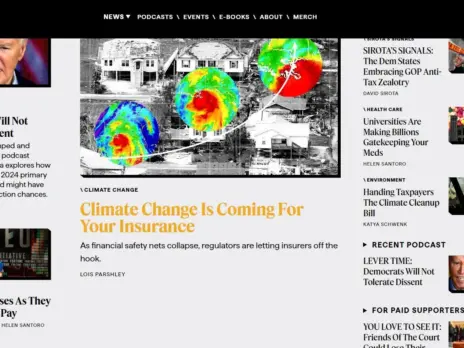
Local newspaper newsroom employees in the US could “all but vanish in the next few years” if the rate of lay-offs forced by the Covid-19 crisis so far continues, according to a Senate report.
In April, Press Gazette mapped all the US local newspapers – more than 1,000 – facing cutbacks to get through the coronavirus pandemic.
The new report shows the effect the crisis has had on the US local news industry in the seven months since, saying the pandemic has made an “already difficult situation nearly impossible” by making existing revenue loss and employment trends more acute.
It estimates that 7,000 US newspaper employees will be laid off in 2020, leaving only about 30,000 newsroom jobs left across the country.
Almost half of the country’s newspaper titles are thought to have laid off or furloughed staff.
“If this rate continues, newspaper newsroom employees may all but vanish in the next few years and, if pandemic-related revenue losses continue for TV and radio broadcasters, local broadcasting could face a similar fate,” the report said.

Impact of Covid-19 on US newspaper industry advertising revenue. Picture: Local Journalism: America’s Most Trusted News Sources Threatened report
The above chart projects the US newspaper industry will face an unrecovered ad revenue loss between 17-28% due to the Covid-19 pandemic through 2021.
The picture for smaller titles was said to be “particularly grim” due to their higher reliance on lower-margin advertising revenue from local businesses and events which has significantly declined.
It comes after a 15-year period in which local newspapers have been forced to let go more than 40,000 employees, which the report calculated as “a full 60% of the journalistic workforce that creates unique local content”.
“Over the past two decades, the local newspaper industry has lost around 70% of its total revenue,” it said. “Local broadcasters are facing similar difficulties, with advertising revenues down more than 40%.
“These losses are leading to news deserts. Already, 200 counties nationwide have no newspapers covering their communities, and half of all US counties are down to just one, a problem that is particularly acute in the South.”
Washington’s Democrat Senator Maria Cantwell, ranking member on the Senate Commerce Committee, released the Local Journalism: America’s Most Trusted News Sources Threatened report to make recommendations for what Congress could do to help the industry.
Among them was support for the ability of news publishers to collectively negotiate for better terms with the tech platforms.
The report accused Google and Facebook of “hijacking” local news, scraping its content and data for their own sites and using their market dominance to do so while offering little to no compensation for this intellectual property.
It noted that the pair of tech giants together control 77% of locally-focused digital advertising revenue in the US – and that Google’s projected ad revenues for this year are expected to top the combined ad revenues of all TV and radio stations in the country.
The report noted the Duopoly’s plans to provide “limited compensation to a small slice of the news sector”, referring to schemes like Google’s pledge to pay $1bn to participating publishers globally over the next three years, an amount it said “still likely represents just a fraction of the total revenue lost by local news outlets”.
Overall, it said: “Whether this compensation will be sufficient, or negotiated on fair terms, remains to be seen.”
The report also criticised Google’s Accelerated Mobile Pages format, saying it harms local news in multiple ways.
“First, the format makes publishers expend significant resources to comply,” it said.
“Second, the format allows Google to collect data about who is viewing the local news content, which allows Google to serve ads to that consumer elsewhere on the web. As a result of AMP, the publisher loses exclusivity over its readers’ data, empowering Google to compete against the publisher to serve ads to the publishers’ own consumers.”
The report suggested that Congress should provide “immediate support” to stabilise newsrooms struggling because of the Covid-19 pandemic, possibly including targeted tax incentives and grants and a renewal and expansion of the Paycheck Protection Program launched earlier in the crisis.
“…it is very difficult to recreate a functioning local newsroom once its unique blend of knowledgeable local reporters, editorial controls, and regional subscribers is lost,” it said.
It also called for Congress to consider forcing news aggregation platforms to enter into “good faith negotiations” with local news media and pay them “fair market value” for their content.
Echoing measures the Australian Competition and Consumer Commission is pursuing, it also called for allowing publishers to collectively bargain for reuse of their content for a limited period – as long as controls are put in place to stop smaller outlets being left behind.
New laws to stop the online advertising market benefiting dominant firms were also mooted.
“While local news outlets have taken many steps to modernise their business models for the Internet age, they need help from Congress to survive the pandemic and level a playing field that is severely tilted in favour of the online platforms,” the report concluded.
News Media Alliance president and chief executive David Chavern said in response: “As Senator Cantwell’s report notes, local news is an essential part of the fabric that keeps our communities informed and connected. But right now, local news is in crisis.
“Two companies, Google and Facebook, effectively regulate news publishers by determining how (and whether) journalism is distributed and monetised.
“The tech giants have refused to return real value back to the creators of quality news and information, even though they pay to license music and many other forms of content. Meanwhile, these companies also benefit from special, broad liability protections under federal law.”
Picture: Shutterstock
Email pged@pressgazette.co.uk to point out mistakes, provide story tips or send in a letter for publication on our "Letters Page" blog






